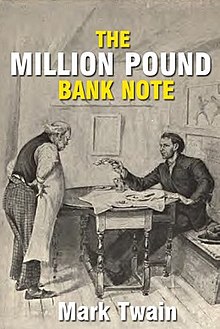The Million Pound Bank Note
"The Million Pound Bank Note" is a short story by the American author Mark Twain, published in 1893.
 | |
| Author | Mark Twain |
|---|---|
| Language | English |
| Genre | Short story |
| Publisher | Langenscheidt ELT |
Publication date | 1893 |
| Pages | 96 |
| ISBN | 978-3-526-52166-2 |
Plot
The story takes place in Victorian London, where the story's protagonist/narrator, Henry Adams, has ended up penniless and in rags after a boating accident in the US swept him out to sea. Two very rich and eccentric brothers spot him and give him an envelope with no information. Seeing money inside the envelope, Henry immediately heads for a cheap dining house, and he pulls the money out of the envelope after he eats (in the presence of the proprietor). Inside the envelope is a single peerless bank note for one million pounds sterling. Without knowing it, Henry is the subject of a bet: Brother B believes that the mere possession of this symbol of wealth, without any other means of support, will enable someone to survive for the month. Brother A, on the other hand, feels that the prohibition (see next paragraph for terms of the bet) against exchanging the note for cash will render it useless.
After he recovers from being stunned, Henry asks the dining house proprietor (named Harris) for change; Harris tells him not to worry about payment. Afterwards, Henry reads the note from the brothers, which explains that they have made a bet on him and that he has to return to the house in 30 days with the bank note intact and unspent; the writer of the accompanying note stated that, if Henry wins the bet for him, Henry can have any situation that he is qualified to fill. Henry realizes that he would not be easily able to exchange the bank note in the bank without being questioned about how he had come to have it, charged with theft and arrested. He would also not be able to spend it since no ordinary person would be able to change it. Finally, in desperation, Henry decides to see if he can use the note to get a cheap suit to replace his rags, similar to the way he got his meal; when he pulls out the million-pound note to pay, the store manager gives him an entire wardrobe on credit. Ultimately, he becomes a celebrity in London as the "vest pocket million-pounder" or the "vest-pocket monster", and Harris' dining house becomes so famous that Harris actually lends Henry money, but Henry tries to keep his borrowings under control so that he will be able to pay everyone back over time when he gets his situation.
After 10 days of growing fame, Henry reports to the US ambassador in London, who Henry learns was a classmate of his father's at Yale. He is invited to a dinner party that night where he meets a young British woman, Portia Langham, with whom he is instantly smitten. During flirting, he tells her the entire story of the gentlemen and their bet, which she finds hilarious. Also at the party was a good friend of Henry's from San Francisco named Lloyd Hastings, who was in London to sell shares in a mine for a commission of £400,000, or $2 million US, but had been unable to find any rich Londoners willing to buy and is about to return to the US without making a sale. Henry offers to use his celebrity to endorse the investment for Hastings in return for 50% of the commission; the shares sell out by the end of the month, although Henry does not tell Portia of his new wealth.
At the end of the month, Portia insists on going with Henry to see the brothers. Henry's success entitles him to a situation from Brother B, but Henry turns it down, showing the brothers his profits from the mining deal. At that, Portia reveals that Brother B is her stepfather, and Henry then asks him for the "situation" as his son-in-law.[1]
Film, television and radio adaptations
- A 1916 Hungarian silent film The One Million Pound Note, directed by Alexander Korda
- An American TV adaptation, the 18th episode of Your Show Time, aired on NBC Television on May 20, 1949
- The 1954 film The Million Pound Note was based on this short story, and starred Gregory Peck as Henry Adams
- The 1968 BBC TV adaptation, The £1,000,000 Bank Note, starred Stuart Damon
- The 1983 comedy film, Trading Places, features elements from both the short story and Twain's novel, The Prince and the Pauper
- The 1994 comedy A Million to Juan starring Paul Rodriguez
- The 2011 BBC Radio 4 adaptation The Million Pound Bank Note, starred Trevor White as Henry Adams
See also
- The £1,000,000 Bank Note and Other New Stories
- Mark Twain bibliography
- Brewster's Millions, a 1902 novel written by George Barr McCutcheon
- Trading Places, a 1983 American comedy film directed by John Landis
References
- Rasmussen, R. Kent (2007). Critical Companion to Mark Twain: A Literary Reference to His Life and Work. Infobase Publishing. Retrieved August 3, 2014.
External links

